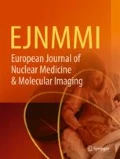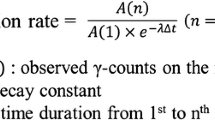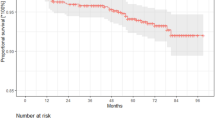Abstract
We sought to evaluate the efficacy, biochemical effects, safety and outcome of recombinant human thyroid-stimulating hormone (rhTSH) as an adjunct to radioiodine treatment of advanced differentiated thyroid carcinoma (DTC). We also sought to determine whether rhTSH is useful as an adjunct to radioiodine treatment following isotretinoin re-differentiation therapy of DTC metastases that have lost function. Therefore, in 54 consecutive patients who had retained bulky metastatic and/or locoregional lesions of DTC despite the exhaustion of other therapeutic options, we gave one to four courses of two consecutive daily intramuscular injections of rhTSH, 0.9 mg, followed by a therapeutic activity of 131I per os on day 3. Fifty patients had received prior radioiodine treatment aided by l-thyroxine (T4) withdrawal. We included in the study 23 patients who had received a trial of isotretinoin therapy for re-differentiation of confirmed de-differentiated metastases. In a blinded, within-patient comparison of post-therapy whole-body scans after the first rhTSH-aided and latest withdrawal-aided treatments in patients with functional metastases at baseline, 18 of 27 (67%) scan pairs were concordant, four (15%) were discordant in favour of the rhTSH-aided scan and five (19%) were discordant in favour of the withdrawal-aided scan. In total, 37 (74%) of 50 paired scans were concordant, eight (16%) favoured rhTSH and five (10%) favoured withdrawal. All differences appeared to be attributable to clinical causes, not to any difference between endogenous and exogenous TSH stimulation. Reflecting the biochemical activity of rhTSH and the release of thyroglobulin (Tg) due to tumour destruction, median serum Tg concentration rose approximately fourfold between baseline and day 6 of the rhTSH-aided treatment course. rhTSH was well tolerated, with mostly minor, transient toxicity, except for neck oedema in three patients with neck infiltrates and pathological spine fracture in one patient with a large vertebral metastasis. At 6 months, complete response occurred in one (2%), partial response in 12 (26%) and disease stabilisation in 19 (40%) of 47 evaluable patients. The rate of complete + partial response was 41% and that of disease stabilisation, 30%, in the 27 evaluable patients with functional metastases at baseline; the corresponding rates were 10% and 55% in the 20 evaluable patients with non-functional metastases at baseline. Although within-patient comparison of early outcome after both modalities is limited by a significantly greater median number of courses and a greater median cumulative activity of radioiodine given under withdrawal, response to rhTSH-aided and withdrawal-aided treatment was similar in 23 (52%) of 44 evaluable patients, superior with rhTSH in 12 (27%) and superior with withdrawal in seven (16%). In two patients, a superior response was obtained after isotretinoin pretreatment and rhTSH and attributed to re-differentiation therapy. In conclusion, our study provides preliminary evidence that rhTSH safely and effectively aids radioiodine treatment of advanced DTC, and does so to an at least equivalent degree as does T4 withdrawal.



Similar content being viewed by others
References
Billewicz WZ, Chapman RS, Crooks J, Day ME, Gossage J, Wayne E, Young JA. Statistical methods applied to the diagnosis of hypothyroidism. Q J Med 1969; 150:255–266.
Dow KH, Ferrel BR, Anello C. Quality-of-life changes in patients with thyroid cancer after withdrawal of thyroid hormone therapy. Thyroid 1997; 7:613–619.
Haugen BR, Pacini F, Reiners C, Schlumberger M, Ladenson PW, Sherman SI, Cooper DS, Graham KE, Braverman LE, Skarulis MC, Davies TF, DeGroot LJ, Mazzaferri EL, Daniels GH, Ross DS, Luster M, Samuels MH, Becker DV, Maxon HR III, Cavalieri RR, Spencer CA, McEllin K, Weintraub BD, Ridgway EC. A comparison of recombinant human thyrotropin and thyroid hormone withdrawal for the detection of thyroid remnant or cancer. J Clin Endocrinol Metab 1999; 84:3877–3885.
Ladenson PW, Braverman LE, Mazzaferri EL, Brucker-Davis F, Cooper DS, Garber JR, Wondisford FE, Davies TF, DeGroot LJ, Daniels GH, Ross DS, Weintraub BD. Comparison of administration of recombinant human thyrotropin with withdrawal of thyroid hormone for radioactive iodine scanning in patients with thyroid carcinoma. N Engl J Med 1997; 337:888–896.
Meier CA, Braverman LE, Ebner SA, Veronikis I, Daniels GH, Ross DS, Deraska DJ, Davies TF, Valentine M, DeGroot LJ, Curran P, McEllin K, Reynolds J, Robbins J, Weintraub BD. Diagnostic use of recombinant human thyrotropin in patients with thyroid carcinoma (phase I/II study). J Clin Endocrinol Metab 1994; 78:188–196.
American Association of Clinical Endocrinologists. American College of Endocrinology 2001 AACE/AAES medical/surgical guidelines for clinical practice: management of thyroid carcinoma. Endocr Pract 2001; 7:202–220.
British Thyroid Association. Royal College of Physicians. Guidelines for the management of thyroid cancer in adults. Salisbury, UK: Sarum ColourView Group, 2002.
Mazzaferri EL. NNCN Thyroid carcinoma practice guidelines. Oncology 1999; 13:391–442.
Schlumberger M, Ricard M, Pacini F. Clinical use of recombinant human TSH in thyroid cancer patients. Eur J Endocrinol 2000; 143:557–563.
Pacini F, Molinaro E, Castagna NG, Lippi F, Ceccarelli C, Agate L, Elisei R, Pinchera A. Ablation of thyroid residues with 30 mCi131I: a comparison in thyroid cancer patients prepared with recombinant human TSH or thyroid hormone withdrawal. J Clin Endocrinol Metab 2002; 87:4063–4068.
Robbins RJ, Larson SM, Sinha N, Shaha A, Divgi C, Pentlow KS, Ghossein R, Tuttle TM. A retrospective review of the effectiveness of recombinant human TSH as preparation for radioiodine thyroid remnant ablation [brief communication]. J Nucl Med 2002; 43:1482–1488.
Chiu AC, Delpassand ES, Sherman SI. Prognosis and treatment of brain metastases in thyroid carcinoma. J Clin Endocrinol Metab 1997; 82:3637–3642.
Colleran KM, Burge MR. Isolated thyrotropin deficiency secondary to primary empty sella in a patient with differentiated thyroid carcinoma: an indication for recombinant thyrotropin. Thyroid 1999; 9:1249–1252.
Jarzab B, Roskosz J, Gawkowska–Suwińska M, Turska M, Handkiewicz-Junak D, Puch Z, Wygoda Z, Zajusz A. Recombinant human TSH for the treatment of differentiated thyroid cancer metastatic to the spine [short communication]. Nucl Med Rev 2000; 3:157–160.
Luster M, Reinhardt W, Koerber C, Lassmann M, Haenscheid H, Michalowski U, Rendl J, Eising E, Mann K, Reiners C. The use of recombinant human TSH in a patient with metastatic follicular cancer and secondary hypothyroidism. J Endocrinol Invest 2000; 23:473–475.
Pellegritti G, Scollo C, Giuffrida D, Vigneri R, Squatrito S, Pezzino V. Usefulness of recombinant human thyrotropin in the radiometabolic treatment of selected patients with thyroid cancer. Thyroid 2001; 11:1025–1030.
Perros P. Recombinant human thyroid-stimulating hormone (rhTSH) in the radioablation of well-differentiated thyroid cancer: preliminary therapeutic experience. J Endocrinol Invest 1999; 22 (11 Suppl):30–34.
Robbins RJ, Voelker E, Wang W, Macapinlac HA, Larson SM. Compassionate use of recombinant human thyrotropin to facilitate radioiodine therapy: case report and review of the literature. Endocr Pract 2000; 6:460–464.
Rotman-Pikielny P, Reynolds JC, Barker WC, Yen PM, Skarulis MC, Sarlis NJ. Recombinant human thyrotropin for the diagnosis and treatment of a highly functional metastatic struma ovarii. J Clin Endocrinol Metab 2000; 85:237–224.
Rudavsky AZ, Freeman LM. Treatment of scan-negative, thyroglobulin-positive metastatic thyroid cancer using radioiodine131I and recombinant human thyroid stimulating hormone. J Clin Endocrinol Metab 1997; 82:11–14.
Jarzab B, Handkiewicz-Junak D, Gawkowska-Suwinska M. Recombinant human TSH in the diagnosis and treatment of disseminated differentiated thyroid cancer. Nucl Med Rev 2000; 3:83–88.
Mariani G, Ferdeghini M, Augeri C, Villa G, Taddei GZ, Scopiano G, Boni G, Bodei L, Rabitti C, Molinari E, Bianci R. Clinical experience with recombinant human thyrotropin (rhTSH) in the management of patients with differentiated thyroid cancer. Cancer Biother Radiopharm 2000; 15:211–217.
Vargas GE, Uy H, Bazan C, Guide TA, Bruder JM. Hemiplegia after thyrotropin alfa in a hypothyroid patient with thyroid carcinoma metastatic to the brain. J Clin Endocrinol Metab 1999; 84:3867–3871.
Berg G, Lindstedt G, Suurküla M, Jansson S. Radioiodine ablation and therapy in differentiated thyroid cancer under stimulation with recombinant human thyroid-stimulating hormone (rhTSH). J Endocrinol Invest 2002; 25:44–52.
Lippi F, Capezzone M, Angelini F, Taddei D, Molinaro E, Pinchera A, Pacini F. Radioiodine treatment of metastatic differentiated thyroid cancer in patients on l-thyroxine, using recombinant human TSH. Eur J Endocrinol 2001; 144:5–11.
Luster M, Lassmann M, Haenscheid H, Michalowski U, Incerti C, Reiners C. Use of recombinant human thyrotropin before radioiodine therapy in patients with advanced differentiated thyroid carcinoma. J Clin Endocrinol Metab 2000; 85:3640–3645.
Schmutzler C, Kohrle J. Retinoic acid redifferentiation therapy for thyroid cancer. Thyroid 2000; 10:393–406.
Simon D, Kohrle J, Reiners C, Boerner AR, Schmutzler C, Mainz K, Goretzki PE, Roeher HD. Redifferentiation therapy with retinoids: therapeutic options for advanced follicular and papillary thyroid carcinoma. World J Surg 1998; 22:569–574.
Boerner AR, Petrich T, Weckesser M, Langen KJ, Knapp WH. Monitoring isotretinoin therapy in thyroid cancer using18F-FDG PET. Eur J Nucl Med 2002; 29:231–236.
Park S-G, Reynolds JC, Brucker-Davis F, Whatley M, McEllin K, Maxted D, Robbins J, Weintraub BD. Iodine kinetics during I-131 scanning in patients with thyroid cancer: comparison of studies with recombinant human TSH (rhTSH) vs. hypothyroidism [abstract] J Nucl Med 1996; 37 (Suppl):15P.
Kukulska A, Gubała E, Deja R, Handkiewicz-Junak D, Włoch J, Jarząb B. Receiver-operator analysis of thyroglobulin estimation during endogenous TSH stimulation in patients with differentiated thyroid cancer [abstract]. IV European Congress of Endocrinology 1998; P3:326.
Maxon HR, Thomas SR, Hertzberg VS, Kereiakes JG, Chen IW, Sperling MI, Saenger EL. Relation between effective radiation dose and outcome of radioiodine therapy for thyroid cancer. N Engl J Med 1983; 309:937–941.
Maxon HR, Englaro EE, Thomas SR, Hertzberg VS, Hinnefeld JD, Chen LS, Smith H, Cummings D, Aden MD. Radioiodine-131 therapy for well-differentiated thyroid cancer--a quantitative radiation dosimetric approach: outcome and validation in 85 patients. J Nucl Med 1992; 33:1132–1136.
Nitsch L, Wollman SH. Thyrotropin preparations are mitogenic for thyroid epithelial cells in follicles in suspension culture. Proc Natl Acad Sci U S A 1980; 77:2743–2747.
Braga M, Ringel MD, Cooper DS. Sudden enlargement of local recurrent thyroid tumor after recombinant human TSH administration. J Clin Endocrinol Metab 2001; 86:5148–5151.
Acknowledgements
We gratefully acknowledge: the generous donation of rhTSH through the Compassionate Use Program of Genzyme Europe BV; the dosimetric help of Aleksandra Etmanska, Milosz Budzynski, Kamil Gorczewski and Anna Mazurkiewicz; the Tg testing carried out by Ewa Czernik, Regina Deja and Anna Chorazy; secretarial assistance rendered by Beata Kutkowska-Kot and Grazyna Pietrzyk; and the editorial assistance furnished by Robert J. Marlowe.
This study was financed by MSC Institute of Oncology grant III-Gliwice-4.1-2000. Editorial assistance on this manuscript was supported by an unrestricted educational grant from Genzyme Europe, BV, Naarden, The Netherlands.
Author information
Authors and Affiliations
Corresponding author
Rights and permissions
About this article
Cite this article
Jarząb, B., Handkiewicz-Junak, D., Roskosz, J. et al. Recombinant human TSH-aided radioiodine treatment of advanced differentiated thyroid carcinoma: a single-centre study of 54 patients. Eur J Nucl Med Mol Imaging 30, 1077–1086 (2003). https://doi.org/10.1007/s00259-003-1190-5
Received:
Accepted:
Published:
Issue Date:
DOI: https://doi.org/10.1007/s00259-003-1190-5




